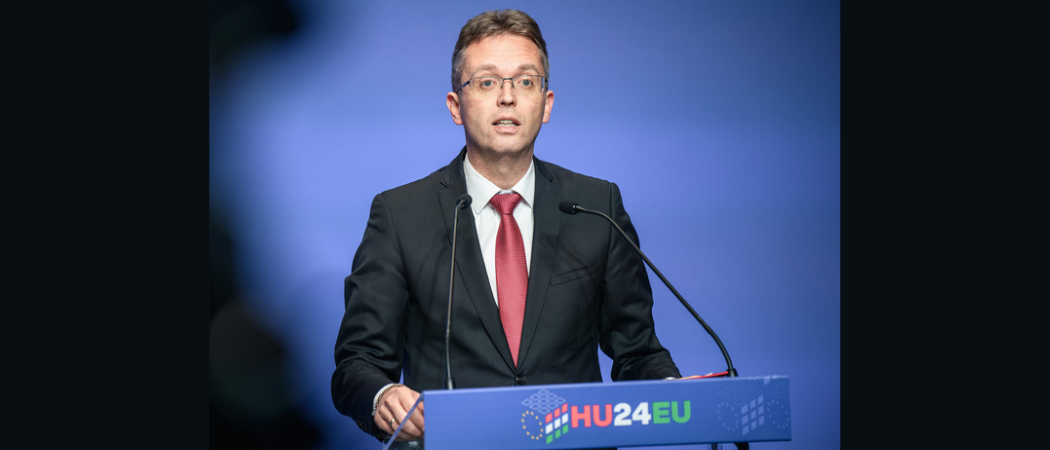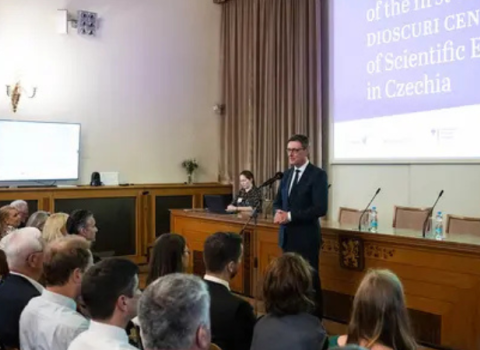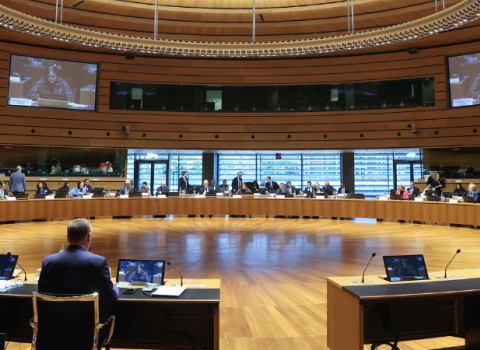Orbán’s government is moving ahead with a proposal to end the deadlock over the EU research funding ban - without Brussels

Balázs Hankó, minister for Culture and Innovation, speaking after chairing an informal meeting of research and higher education ministers in Budapest. Photo credit: European Union
The ongoing dispute between Brussels and Hungary over the EU funding ban overshadowed “very fruitful” ministerial talks on the future of European research and education last week, according to Hungarian innovation minister Balázs Hankó, who chaired the meeting.
Hankó said the Hungarian government submitted a document to the Commission nine months ago addressing concerns about academic freedom and transparency principles that led to the ban. Hungarian researchers and students are waiting to hear the reasons for their continued exclusion, he said.
“We decided not to wait any longer for Brussels’ answer,” Hankó told a press conference. “We will submit the regulatory proposal to the parliament. We trust that our regulatory proposal will resolve the silence and resolve the situation.”
Hankó also complained that Marc Lemaître, EU director general for research and innovation, did not attend a post meeting press conference, perceiving this as a slight and a reflection of the funding row. “You can see that it is not easy to work with the Commission,” he said. “Our cooperation is not without problems.”
With Hungary holding the rotating presidency of the EU Council, EU research and higher education ministers were meeting in Budapest on September 16 and 17, to address the gaps in the European innovation system and discuss how to strengthen competitiveness.
An EU spokesperson told Science|Business President Ursula von der Leyen decided at the start of the Hungarian presidency that the European Commission would be represented by a senior civil servant during informal meetings of the Council, but they could not speak on the record and could not participate in press conferences.
For its part, the Hungarian Ministry for Culture and Innovation told Science|Business the situation was “regrettable”, adding, “In any case, it shows that the Commission’s current decision also poses the potential risk that it is considering political considerations against its defined task.”
The row goes back to late 2022 when the Commission barred more than 30 Hungarian institutions, including 21 universities, from accessing Horizon Europe and Erasmus+ research funds, over concerns that government-imposed changes to their management structures undermined academic freedom and transparency.
With negotiations stalling, academics have become increasingly isolated. In August, the Hungarian Young Academy said the ban could damage the reputation of Hungarian science.
While Hungarian academics cannot obtain EU grants, they are eligible to take part in Horizon Europe projects if they have an alternative source of funding. Earlier this year, Lemaître asked national contact points to spread the message that Hungarian participants can still join the programme.
In addition to a €12.8 million fund to cover the participation of scientists from barred institutions, Orbán’s government launched domestic alternatives to both European programmes, known as HU-rizon and the Pannónia Scholarship Programme.
Make Europe great again
Turning to a report of the ministerial meeting, Hankó said, “There is a consensus in the EU that we need to take steps to improve our competitiveness,” and that this includes improving research and innovation.
On the unified European degree that has been proposed by the Commission, there was “quite a heated debate,” Hankó said, noting “Many countries believe that this goes against national systems.” Hankó himself approves of the idea, providing that such a qualification takes account of national characteristics. He called for this to be built around the Bologna process, set up to ensure comparability in the standards and quality of higher education qualifications.
“We have the Bologna process in place. Let us look how we can strengthen it,” he said.
One of Hungary’s priorities at the helm of the Council, has been to make the EU research and innovation ecosystem more effective. That aligns with former Italian prime minister Mario Draghi’s call in early September to double the research budget to €200 billion in the next Framework Programme starting in 2028.
“If we look at the last decade alone, we see that the EU scientific performance has declined by 8 percentage points, while China and the United States have overtaken us,” Hankó said. He called on member states to acquaint themselves with the ‘Hungarian model’ which aims to spur cooperation by supporting partnerships between universities, training institutes and companies.
Hankó also said that despite central and eastern European countries accounting for a quarter of the EU population, only about 8% of applicants are successful in accessing EU research funding. “Strong nations, strong research cooperation: that’s how we will have a strong Europe,” he said. “That’s what we recommend to member states of the EU and the European Commission to make Europe great again.”
Editor's note: This article was updated 26 September 2024 to correct the budget of the HU-rizon. The Hungarian government has allocated €12.8 million for the back-up funding scheme.





 A unique international forum for public research organisations and companies to connect their external engagement with strategic interests around their R&D system.
A unique international forum for public research organisations and companies to connect their external engagement with strategic interests around their R&D system.